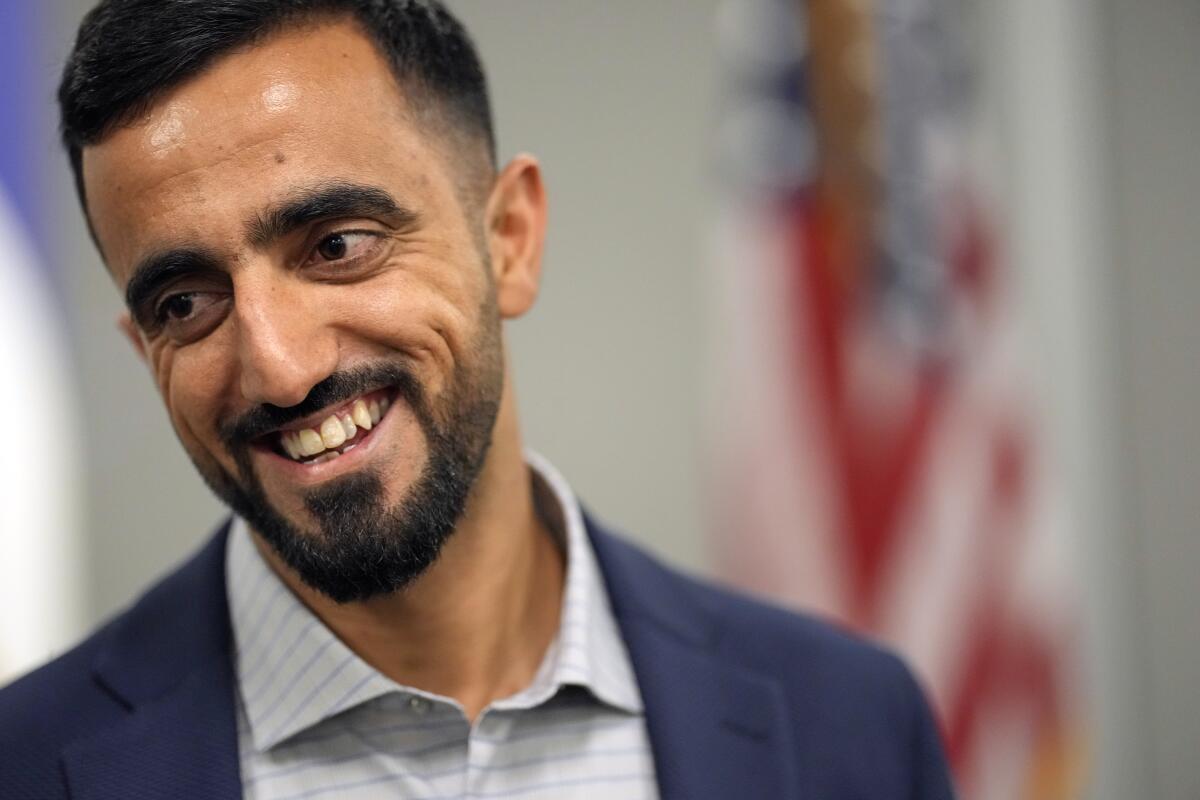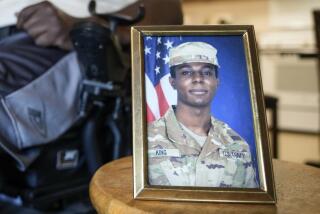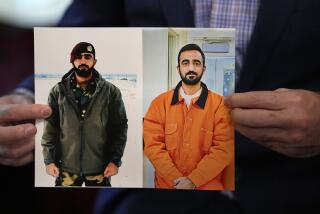Afghan soldier seeking U.S. asylum hopes for ‘American dream’

- Share via
HOUSTON — In the months he was held in detention in Texas during his legal fight to remain in the U.S., Afghan soldier Abdul Wasi Safi thought he would eventually be returned to his home country and meet a likely death at the hands of the Taliban because of his work with the U.S. military.
But on Friday, he stood a free man, filled with hope that the help he provided the U.S. military will ultimately help him secure asylum in the U.S.
Amid hugs from his brother and lawyers, Wasi Safi proudly smiled as he received an award from one of his supporters — Congresswoman Sheila Jackson Lee, a Democrat from Houston — that honored his military service to the U.S. He said he hoped that would be a harbinger of things to come for him in his new life in the United States.
“I am hopeful about the next step in this process and one day being able to live the American dream,” Wasi Safi said at a news conference in Houston.
At least three people were killed and four wounded Saturday morning in a shooting in the upscale Benedict Canyon area of Los Angeles.
For the past few months, Wasi Safi, 27, had been jailed by federal authorities after being arrested while crossing the U.S.-Mexico border in September near Eagle Pass, Texas.
An intelligence officer for the Afghan National Security Forces, he had fled Afghanistan following the withdrawal of U.S. forces in August 2021, fearing reprisals from the Taliban. After making his way last year to Brazil, he started a months-long journey to the U.S. in summer 2022, crossing 10 countries on his treacherous trek.
Wasi Safi had been facing a federal immigrant charge. But a judge on Monday dropped the count at the request of prosecutors. He was freed from a detention center in Eden, Texas, on Wednesday and was reunited with his brother, Sami-ullah Safi, 29, who goes by Sami and lives in Houston.
“Today a wrong has been made right, and I would like to thank those who have worked tirelessly to secure justice for my brother,” said Sami Safi, who had been employed in Afghanistan by the U.S. military as a translator before he moved to the U.S.
The lawyers, bipartisan lawmakers and military organizations that have been working to free Wasi Safi say his case highlights how America’s chaotic military withdrawal from Afghanistan continues to harm Afghan citizens who helped the U.S. but were left behind.
Jackson Lee said being able to free Wasi Safi from detention and provide him help and resources as he applies for asylum is part of the promise the U.S. has long made to those such as Afghan soldiers who have helped the country’s military in its efforts to preserve democracy.
“America made a promise. Today we emphasize America kept her promise,” Jackson Lee said.
Wasi Safi, whose case was first reported by the Texas Tribune, had suffered serious injuries from beatings during his journey to the U.S., including damaged front teeth and hearing loss in his right ear. Sami Safi said as his brother’s asylum claim is reviewed, he will be helping him heal his body and mind and get him acclimated to living in the U.S.
Wasi Safi said part of what he hopes his American dream includes is being able to work and support those members of his family who remain in Afghanistan, including his parents, six sisters and two other brothers. He hopes that one day, they can all be reunited.
Nearly 76,000 Afghans who worked with American soldiers since 2001 as translators, interpreters and partners arrived in the U.S. on military planes after the U.S. withdrawal from Afghanistan. But their immigration status remains unclear after Congress failed to pass a proposed law, the Afghan Adjustment Act, that would have solidified their legal residency status.
“Please do not forget that there are people who are still left behind. This is not the last person. This is the first page of the book. Please raise your voice. There are hundreds of people. There are thousands of people that are every day being targeted,” said Nisar Momand, a former interpreter for the U.S government who left Afghanistan and now lives in Houston.
More to Read
Sign up for Essential California
The most important California stories and recommendations in your inbox every morning.
You may occasionally receive promotional content from the Los Angeles Times.










